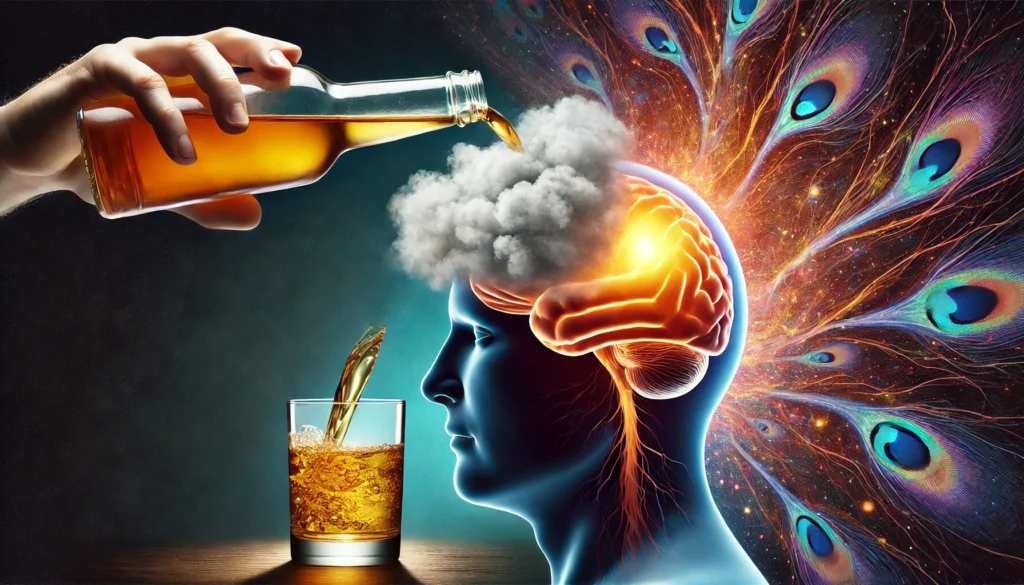Alcohol consumption is a prevalent social activity worldwide, yet it carries inherent risks, particularly concerning cognitive health. While moderate drinking may appear harmless, the effects of alcohol on memory can be significant and far-reaching. In this article, we delve into the relationship between alcohol and memory loss, offering guidelines to help minimize the associated risks of alcohol consumption.
You may also like: Understanding the Science Behind Lost Memory
Understanding the Impact of Alcohol on Memory
The effects of alcohol on memory can vary widely depending on numerous factors such as the quantity consumed, frequency of consumption, and the individual’s overall health and genetic predispositions. The primary concern is alcohol’s potential to disrupt both short-term and long-term memory functions, which can significantly affect one’s quality of life.
Short-term Memory and Alcohol
Short-term memory, or working memory, involves the brain’s ability to temporarily store and recall information. Alcohol consumption can impair this critical function, leading to increased forgetfulness and difficulties in concentration and task execution.
Immediate Effects of Alcohol on Short-term Memory
When alcohol enters the bloodstream, it impacts neurotransmitters, which are essential for brain communication. This disruption can lead to immediate effects such as confusion and an inability to focus, which are hallmark symptoms of alcohol-induced memory impairment.
Social and Professional Implications
The impairment of short-term memory can have social and professional repercussions. Forgetting important conversations or tasks can strain relationships and hinder work performance, emphasizing the importance of understanding alcohol’s impact on cognitive functions.
Strategies to Mitigate Short-term Memory Loss
Implementing strategies such as pacing alcohol intake and alternating with non-alcoholic beverages can help manage the effects on short-term memory. Being mindful of the body’s response to alcohol is crucial in minimizing immediate cognitive disruptions.
How Alcohol Affects Short-term Memory
Alcohol’s effect on neurotransmitters hinders the brain’s ability to process and store information effectively. This interference leads to classic symptoms such as blackouts and the inability to recall recent events, which are particularly concerning during repeated heavy drinking sessions.
Neurotransmitter Disruption
Alcohol alters the balance of neurotransmitters such as glutamate and gamma-aminobutyric acid (GABA), which play a pivotal role in memory formation and retrieval. This disruption can cause lapses in memory, even after the effects of alcohol have worn off.
The Phenomenon of Blackouts
Blackouts, periods of amnesia during intoxication, are a stark indicator of alcohol’s impact on memory. Understanding the triggers and prevalence of blackouts can aid in recognizing the risks and taking preventive measures.
Preventive Measures
To prevent short-term memory loss from progressing, individuals should be aware of their alcohol limits and seek to maintain those boundaries. Education on the effects of alcohol on neurotransmitters can empower individuals to make informed decisions.
Long-term Memory and Alcohol
While the short-term effects of alcohol are more immediate, long-term abuse can have devastating consequences on memory retention and recall. Chronic alcohol consumption can lead to significant brain changes, particularly in areas responsible for memory and learning.
Brain Structure Alterations
Chronic alcohol abuse can lead to structural changes in the brain, particularly in the hippocampus, which is vital for memory formation. These changes can result in severe memory deficits over time, underscoring the importance of understanding long-term risks.
Cognitive Decline and Learning Difficulties
Prolonged alcohol use can lead to cognitive decline and difficulties in learning new information. This can affect an individual’s ability to acquire new skills or knowledge, impacting personal and professional development.
The Role of Vitamin B1 Deficiency
A deficiency in vitamin B1 (thiamine) due to alcohol abuse can lead to neurological disorders like Wernicke-Korsakoff syndrome. Ensuring adequate nutrition can play a critical role in preventing such conditions and maintaining cognitive health.
Consequences of Long-term Alcohol Use
Prolonged alcohol abuse can lead to severe conditions, including Wernicke-Korsakoff syndrome, a neurological disorder caused by thiamine deficiency. This syndrome manifests as severe memory problems and cognitive dysfunction, highlighting the long-term risks of excessive alcohol consumption.
Understanding Wernicke-Korsakoff Syndrome
This syndrome is characterized by two phases: Wernicke’s encephalopathy, which involves acute symptoms such as confusion and lack of coordination, and Korsakoff’s psychosis, which leads to chronic memory issues. Early detection and treatment are crucial to prevent irreversible damage.
Preventive Health Measures
Regular health check-ups and nutritional assessments can help identify risks early. Supplementing with vitamin B1 and other essential nutrients can be a proactive measure in preventing alcohol-related cognitive decline.
The Importance of Early Intervention
Recognizing the early signs of cognitive impairment due to alcohol use is vital. Seeking professional help and making lifestyle changes can halt or reverse some of the damage, improving quality of life.
Can Drinking Cause Memory Problems?
Indeed, alcohol consumption can cause memory problems. Both occasional heavy drinking sessions and chronic alcohol consumption can have detrimental effects on memory, with varying degrees of impact based on individual circumstances.
Factors Influencing Memory Loss from Alcohol
Several factors contribute to memory loss from alcohol consumption, including the amount and frequency of alcohol intake, age, health status, and genetic predispositions. Understanding these factors can help in assessing personal risk levels.
Quantity and Frequency of Consumption
The risk of memory impairment increases with the amount and frequency of alcohol consumption. Binge drinking, in particular, poses a significant threat to memory function, emphasizing the importance of moderation.
Age-related Vulnerabilities
Older adults are more susceptible to alcohol-induced memory problems due to age-related changes in brain function and metabolism. Tailoring alcohol consumption guidelines to age can help mitigate these risks.

Genetic Predispositions
Genetic factors can influence an individual’s susceptibility to alcohol dependence and its effects on memory. Awareness of family history can guide personal choices regarding alcohol consumption.
Recognizing the Signs of Alcohol-Induced Memory Loss
Recognizing the symptoms of alcohol-induced memory loss is crucial for taking timely action. Common signs include frequent forgetfulness, difficulty recalling recent events, and blackouts or lapses in memory after drinking.
Identifying Early Symptoms
Early recognition of memory issues, such as misplaced items or forgotten conversations, can prompt individuals to seek help before the problems escalate. Keeping a journal of drinking patterns and memory lapses can aid in this process.
The Impact on Daily Life
Memory loss can significantly affect daily life, from forgetting appointments to struggling with work tasks. Understanding the impact can motivate individuals to seek interventions and adopt healthier drinking habits.
Seeking Professional Assessment
Consulting with a healthcare professional for a thorough assessment can provide clarity on the extent of memory loss and guide appropriate interventions. Early intervention is key to preventing further cognitive decline.
Guidelines for Alcohol Consumption to Protect Memory
Understanding the risks associated with alcohol and memory loss allows us to develop guidelines that can help mitigate these effects. By following these guidelines, individuals can enjoy alcohol responsibly while protecting their cognitive health.
Moderation is Key
Moderation is essential in reducing the risk of memory impairment from alcohol. The Centers for Disease Control and Prevention (CDC) defines moderate drinking as up to one drink per day for women and up to two drinks per day for men.
Understanding Moderate Drinking Limits
Educating oneself about what constitutes a standard drink and adhering to these limits can help prevent overconsumption. Awareness of personal tolerance and drinking habits is crucial for maintaining moderation.
Cultural and Social Influences
Cultural norms and social settings can influence drinking behavior. Understanding these influences can help individuals navigate social situations without compromising their commitment to moderation.
Setting Personal Boundaries
Establishing personal boundaries for alcohol consumption can empower individuals to make mindful choices. Communicating these boundaries to friends and family can garner support in maintaining healthy drinking habits.
Hydration and Nutrition
Maintaining proper hydration and ensuring adequate nutrition, particularly vitamin B1, can help protect against the negative effects of alcohol on memory. A balanced diet supports overall brain health and cognitive function.
The Role of Hydration in Cognitive Function
Dehydration can exacerbate the cognitive impairments caused by alcohol. Drinking water alongside alcoholic beverages can help mitigate dehydration and support memory retention.
Importance of a Nutrient-rich Diet
A diet rich in essential vitamins and minerals, including vitamin B1, supports brain health and can counteract some of the negative effects of alcohol. Incorporating a variety of nutrient-dense foods can enhance cognitive resilience.
Supplementing for Brain Health
For individuals at risk of nutrient deficiencies, supplements can provide additional support for brain health. Consulting with a healthcare provider can guide appropriate supplementation choices.
Mindful Drinking Practices
Adopting mindful drinking practices can help individuals control their alcohol intake and protect their memory. Such practices include pacing oneself, alternating with non-alcoholic beverages, and knowing personal limits.
Pacing and Timing
Pacing alcohol consumption by sipping slowly and spacing out drinks can prevent excessive intake. Setting a time limit for drinking occasions can also help maintain control.
Integrating Non-Alcoholic Alternatives
Alternating alcoholic beverages with non-alcoholic options can help maintain hydration and reduce overall alcohol consumption. Exploring a variety of non-alcoholic drinks can make this practice enjoyable.
Self-awareness and Responsibility
Being aware of how one’s body responds to alcohol and recognizing signs of impairment are essential for responsible drinking. Taking breaks from alcohol can offer insights into its effects on personal well-being.
Recovering Memory After Drinking
In cases where memory loss has occurred due to alcohol consumption, certain steps can aid in recovery. Engaging in cognitive exercises, seeking professional help, and making lifestyle changes can support memory recovery and overall brain health.
Cognitive Exercises
Participating in activities that challenge the brain, such as puzzles, reading, and memory games, can aid in strengthening cognitive function. These exercises promote neuroplasticity and enhance memory recall.
Benefits of Brain Stimulation
Regular cognitive stimulation can improve memory and cognitive function, helping to counteract the effects of alcohol on the brain. Incorporating these activities into daily routines can yield long-term benefits.
Examples of Cognitive Activities
Memory games, Sudoku, crossword puzzles, and even learning new skills or languages can boost cognitive function. Finding enjoyable activities can increase motivation to engage regularly.
Creating a Cognitive Exercise Routine
Developing a routine that includes a variety of cognitive exercises can ensure comprehensive brain engagement. Balancing challenging tasks with enjoyable activities can enhance adherence to the routine.
Professional Help
For those struggling with chronic alcohol use and memory loss, seeking help from a healthcare professional is crucial. Cognitive rehabilitation therapies and counseling can provide support in recovery and help address underlying issues.

The Role of Cognitive Rehabilitation
Cognitive rehabilitation focuses on improving specific cognitive skills affected by alcohol use. Tailored programs can address individual needs, enhancing memory and cognitive resilience.
Accessing Counseling and Support Services
Counseling services can offer emotional and psychological support, helping individuals cope with the challenges of memory loss and alcohol dependence. Support groups can also provide a sense of community and shared experience.
Long-term Benefits of Professional Intervention
Early and sustained professional intervention can prevent further cognitive decline and improve overall quality of life. Regular follow-ups and adjustments to treatment plans can ensure ongoing progress.
Lifestyle Changes
Incorporating regular physical activity, a balanced diet, and adequate sleep can improve overall brain health and memory function. These lifestyle changes support cognitive recovery and enhance well-being.
The Impact of Physical Activity
Exercise increases blood flow to the brain, promoting neurogenesis and cognitive function. Regular physical activity can help reverse some of the damage caused by alcohol and support memory recovery.
Importance of Sleep for Memory
Adequate sleep is crucial for memory consolidation and cognitive health. Establishing a consistent sleep schedule can enhance memory retention and overall brain function.
Dietary Adjustments for Cognitive Health
A diet rich in omega-3 fatty acids, antioxidants, and essential nutrients supports brain health and cognitive function. Making dietary adjustments can aid in memory recovery and overall well-being.
Future Implications and Research
Ongoing research continues to explore the relationship between alcohol and memory, with studies focusing on how genetics, neurobiology, and lifestyle factors interplay in this complex issue. As we gain a deeper understanding, new strategies for prevention and treatment are likely to emerge.
Genetic and Neurobiological Studies
Research into genetic predispositions and neurobiological mechanisms can provide insights into individual vulnerabilities and resilience to alcohol’s effects on memory. These studies may lead to personalized prevention and treatment strategies.
Exploring Genetic Markers
Identifying genetic markers associated with alcohol-related memory impairment can inform targeted interventions and preventative measures. This knowledge can guide personalized healthcare approaches.
Understanding Neurobiological Pathways
Investigating the neurobiological pathways affected by alcohol can reveal potential targets for therapeutic intervention. This research may lead to the development of new medications to protect or restore memory function.
Implications for Personalized Medicine
The integration of genetic and neurobiological research into clinical practice can pave the way for personalized medicine approaches. Tailoring interventions based on individual risk factors can enhance treatment efficacy.
Advances in Cognitive Rehabilitation
Innovations in cognitive rehabilitation techniques can offer new hope for individuals affected by alcohol-related memory loss. Emerging therapies aim to restore cognitive function and improve quality of life.
Technological Innovations in Therapy
The use of technology in cognitive rehabilitation, such as virtual reality and computer-based programs, can provide engaging and effective treatment options. These innovations can enhance accessibility and patient engagement.
Collaborative Approaches to Treatment
Collaborative approaches that involve healthcare professionals, researchers, and patients can drive advancements in cognitive rehabilitation. Integrating diverse perspectives can lead to more comprehensive and effective treatment strategies.
Evaluating Long-term Outcomes
Longitudinal studies evaluating the outcomes of cognitive rehabilitation interventions can provide valuable insights into their long-term effectiveness. Understanding these outcomes can inform future research and clinical practice.
Lifestyle Interventions and Public Health
Research into lifestyle interventions and public health strategies can inform policies and programs aimed at reducing alcohol-related memory loss. These initiatives can promote awareness and encourage healthier behaviors.
Promoting Public Awareness
Public health campaigns can educate communities about the risks of alcohol consumption and its impact on memory. Raising awareness can empower individuals to make informed decisions about their drinking habits.
Developing Community-based Programs
Community-based programs that promote healthy lifestyle choices and provide support for individuals at risk can reduce the prevalence of alcohol-related memory loss. These programs can foster a supportive environment for behavior change.
Evaluating Policy Impact
Evaluating the impact of public health policies on alcohol consumption and memory health can inform future strategies. Continuous assessment can ensure that policies remain effective and responsive to emerging research.
Conclusion
Alcohol can have significant effects on memory, impacting both short-term and long-term cognitive functions. By understanding the risks and following recommended guidelines for alcohol consumption, individuals can protect their memory and overall brain health. Mindful drinking, combined with a healthy lifestyle, can minimize the adverse effects of alcohol on memory, allowing you to enjoy the social aspects of drinking while safeguarding your cognitive well-being.
Embracing Mindful Drinking
Mindful drinking involves making conscious choices about alcohol consumption, considering both immediate and long-term impacts on memory and health. Embracing this approach can enhance well-being and quality of life.
Setting Realistic Goals
Setting realistic goals for alcohol consumption can help individuals maintain a balanced approach to drinking. These goals should align with personal health objectives and lifestyle preferences.
Building a Supportive Environment
Creating a supportive environment with friends and family can facilitate mindful drinking practices. Encouraging open discussions about alcohol and its effects can foster mutual understanding and support.
Celebrating Progress
Recognizing and celebrating progress in adopting mindful drinking habits can reinforce positive behavior changes. Acknowledging achievements can motivate continued commitment to cognitive health.
Prioritizing Cognitive Health
Prioritizing cognitive health through lifestyle choices, such as regular exercise, a balanced diet, and adequate sleep, is essential for protecting memory from the effects of alcohol.
Integrating Healthy Habits
Integrating healthy habits into daily life can support cognitive resilience and overall well-being. Consistency in these practices is key to long-term benefits.
Seeking Professional Guidance
Seeking guidance from healthcare professionals can provide personalized advice and support in maintaining cognitive health. Professional input can enhance understanding and management of alcohol-related risks.
Committing to Lifelong Learning
Lifelong learning and cognitive engagement can support brain health and memory function. Staying mentally active through various activities can promote continuous cognitive development.
Looking Towards a Healthier Future
As research advances, new insights and strategies for preventing and treating alcohol-related memory loss will continue to emerge. Staying informed and adapting to new knowledge can enhance cognitive health and quality of life.
Embracing Change and Innovation
Embracing change and innovation in healthcare and lifestyle practices can lead to improved outcomes for individuals affected by alcohol-related memory issues. Openness to new approaches can drive progress.
Engaging with Research Developments
Engaging with ongoing research developments can provide valuable insights into effective prevention and treatment strategies. Staying informed can empower individuals to make proactive choices for their cognitive health.

Fostering a Culture of Health
Fostering a culture that values health and well-being can encourage healthier behaviors and support individuals in reducing alcohol-related risks. Community involvement and collaboration can drive positive change.
Further Reading:
What Happened? Alcohol, Memory Blackouts, and the Brain
How Alcohol Is Linked to Memory Loss
Important Note: The information contained in this article is for general informational purposes only, and should not be construed as health or medical advice, nor is it intended to diagnose, prevent, treat, or cure any disease or health condition. Before embarking on any diet, fitness regimen, or program of nutritional supplementation, it is advisable to consult your healthcare professional in order to determine its safety and probable efficacy in terms of your individual state of health.
Regarding Nutritional Supplements Or Other Non-Prescription Health Products: If any nutritional supplements or other non-prescription health products are mentioned in the foregoing article, any claims or statements made about them have not been evaluated by the U.S. Food and Drug Administration, and such nutritional supplements or other health products are not intended to diagnose, treat, cure, or prevent any disease.


